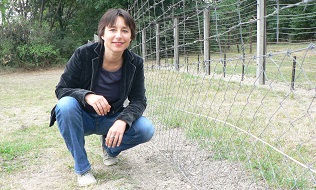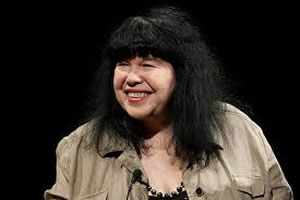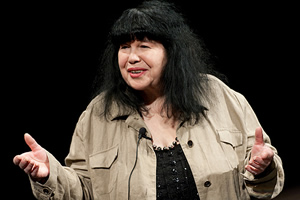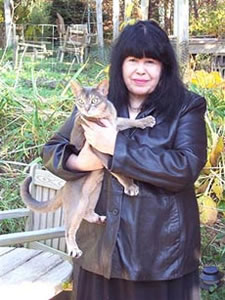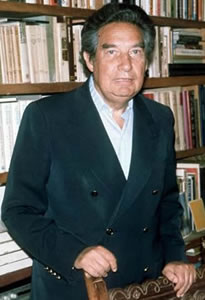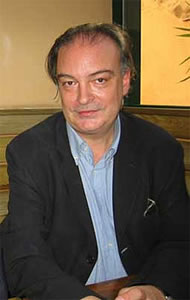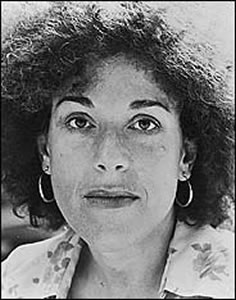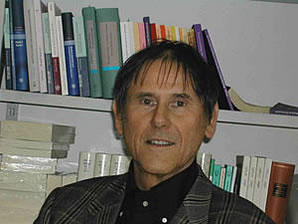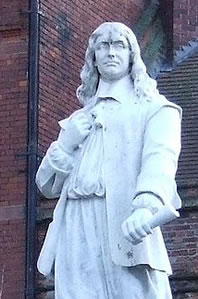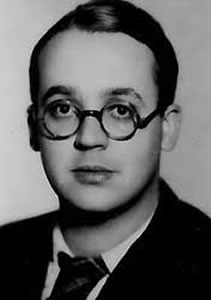De Duitse dichteres en schrijfster Angela Kreuz werd geboren in Ingolstadt op 31 maart 1969. Zie ook alle tags voor Angela Kreuz op dit blog.
Uit: Straßenbahnträumer
„Jens knöpfte das Hemd wieder auf und suchte im Zimmer nach seinem Portemonnaie. Auf dem Weg zum Bad stolperte er über einen Umzugskarton und stieß sich den kleinen Zeh an. Bislang hatte er nur das Nötigste ausgepackt, überall standen die dämlichen Kisten herum. Er schaltete den Kassettenrekorder an, der auf der Waschmaschine lag; zum Rasieren passten am besten die Violent-Femmes-Sachen aus den End-Achtzigern. Jens nahm ein Handtuch vom Wannenrand und rubbelte seine Haare trocken. Er blickte in den Spiegel, der mittlerweile von Zahnputzspritzern übersät war, und drehte den Wasserhahn auf. So oft er sich auch vornahm, Putzmittel zu besorgen – er vergaß es, sobald er aus der Haustüre war. Seit dem Umzug war er irgendwie zu nichts gekommen. Außerdem sollte er endlich die grässliche Energiesparlampe seines Vorgängers durch eine gute alte Glühbirne ersetzen. Das kalte Licht betonte geradezu die Falten und Ringe unter seinen braunen Augen, die sich langsam zu Tränensäcken auswuchsen. Warum ihm alle Welt immer sagte, er sähe jugendlich aus, verstand er nicht. Er quetschte den Rest Rasiercreme in einen Tiegel, schäumte ihn mit dem Pinsel auf, seifte sich das Kinn ein und klappte das Rasiermesser auf. Lizzy machte sich regelmäßig über seinen Rasierkult lustig, sie hatte gut reden. Monotasking, dachte Jens, das ist es. Er summte die Melodie mit. See my ships, they’re sailing In and out of the harbor Nach der Rasur warf er sich kaltes Wasser ins Gesicht und malte seinem Spiegelbild mit dem Daumen ein Kreuz auf die Stirn.
Jens traf die Kollegen auf der Straße vor dem Pub. Holger mit Sonnenbrille, obwohl die Sonne längst untergegangen war, und Dirk im Wollmantel, als wäre es ein kalter Winterabend. Anne trug karierte Plateauturnschuhe. „Hi.“ Der Ausschnitt ihrer Knitterbluse ließ tief blicken. Hatte er sich beim Rasieren geschnitten oder warum starrte sie ihn so an? „Auch schon da.“ Holger blickte auf seine klobige Sportuhr. „Ich bin aufgehalten worden“, sagte Jens wahrheitsgemäß, da er der Nachbarin noch beim Rauchen zugesehen und dabei die Zeit völlig vergessen hatte. Außerdem war ihm, kurz bevor er aus dem Haus gehen wollte, noch der Rasierpinsel mit dem Griff nach unten in den Ausguss gefallen. Sie traten in den Hausflur. Jens nickte dem Portrait von Mister Murphy an der Wand zu. Anything that can go wrong will go wrong. Sie stiegen die steinerne Wendeltreppe hinab in den Keller. Das Lokal war ein illegaler Raucherclub und voll besetzt bis auf den Tisch neben der Dart-Scheibe. Klasse. Sie belegten die Plätze mit ihren Jacken und bestellten an der Theke Guinness, alle bis auf Anne, die verkündete, dass sie kein Bier mochte. Am Tresen saßen zwei verkniffene Typen in dunklen Anzügen; wahrscheinlich arbeiteten sie für den Geheimdienst. Jens spielte mit der Kette seiner Taschenuhr, das fröhliche Folk-Gedudel ging ihm bereits auf den Zeiger. Zwei Stunden würde er wohl bleiben müssen, als Beweis seines Goodwill. Er war nicht der Typ, der sich mit Arbeitskollegen dick befreundete und auf Betriebsausflügen Spaß hatte.“
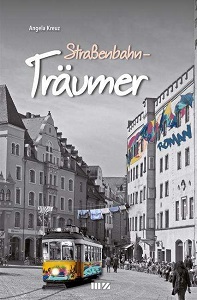
Angela Kreuz (Ingolstadt, 31 maart 1969)
Cover
De Amerikaanse schrijfster Judith Rossner werd geboren als Judith Perelman op 31 maart 1935 in New York. Zie ook alle tags voor Judith Rossner op dit blog.
Uit: Emmeline
“This is the story of Emmeline Mosher, who, before her fourteenth birthday, was sent from her home on a farm in Maine to support her family by working in a cotton mill in Massachusetts. The year was 1839. Fayette, where Emmeline lived, was then known for its fine dairy cattle, but Emmeline’s parents had a small farm on a rocky hillside, and even in good times they had not prospered. This was a period in which business conditions were poor throughout Maine, and for three years Emmeline’s father had been unable to find work to supplement the small yield from the farm. Then, the past season, a killing frost had come in June to destroy all their tender seedlings. Now it was only the third week of November, but from the look of their larder they might have been well into winter. There were nine children, and they were hungry all the time. The three-year-old cried to nurse at his mother’s breast when the one-and-a-half-year-old was in her arms, but Emmeline’s mother didn’t get enough food to provide milk for two children. In fact, since the death of her last baby, within hours of its birth, she seemed to have difficulty providing enough for one. Emmeline, the oldest child, would watch and think what a help it would be if only she could nurse them. At most tasks she and her mother worked together like equals. Sarah Mosher was thirty-one years old; Emmeline was thirteen.
For some time now there had been a feeling among the older children and their parents that something would have to happen; there must be some change from the outside that would make it possible for them to go on. Sarah Mosher, always intensely devout, trusted that God in His own way and time would help them, but Henry Mosher had stopped going to church in recent weeks, saying that if God had no time to bother about him, then he had no time for God. When help finally came, it was difficult, at first, to find in it any sign of God’s work. Emmeline’s aunt and uncle, Hannah and Abner Watkins, came to visit from their home in Lynn, Massachusetts, for the first time in many years. It was a painful visit for everyone. Not only were the Watkinses shocked at how little food there was, and at how badly matters were going in general, but Hannah, in particular, had a very critical air, her manner suggesting that if Henry Mosher’s moral fiber had been stronger, there would not have been poor business conditions or late frosts in Maine. Emmeline’s mother, still not recovered from five babies in four years, and the last born only to die within hours, seemed ashamed under her sister-in-law’s scrutiny.”
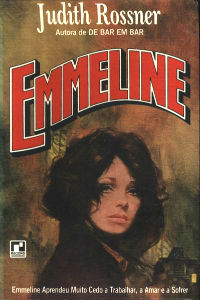
Judith Rossner (31 maart 1935 – 9 augustus 2005)
Cover
De Engelse dichter Andrew Marvell werd geboren in Winestead, Yorkshire op 31 maart 1621 in Londen. Zie ook alle tags voor Andrew Marvell op dit blog.
The Character Of Holland (Fragment)
But when such Amity at home is show’d;
What then are their confederacies abroad?
Let this one court’sie witness all the rest;
When their hole Navy they together prest,
Not Christian Captives to redeem from Bands:
Or intercept the Western golden Sands:
No, but all ancient Rights and Leagues must vail,
Rather then to the English strike their sail;
to whom their weather-beaten Province ows
It self, when as some greater Vessal tows
A Cock-boat tost with the same wind and fate;
We buoy’d so often up their Sinking State.
Was this Jus Belli & Pacis; could this be
Cause why their Burgomaster of the Sea
Ram’d with Gun-powder, flaming with Brand wine,
Should raging hold his Linstock to the Mine?
While, with feign’d Treaties, they invade by stealth
Our sore new circumcised Common wealth.
Yet of his vain Attempt no more he sees
Then of Case-Butter shot and Bullet-Cheese.
And the torn Navy stagger’d with him home,
While the Sea laught it self into a foam,
‘Tis true since that (as fortune kindly sports,)
A wholesome Danger drove us to our ports.
While half their banish’d keels the Tempest tost,
Half bound at home in Prison to the frost:
That ours mean time at leisure might careen,
In a calm Winter, under Skies Serene.
As the obsequious Air and waters rest,
Till the dear Halcyon hatch out all its nest.
The Common wealth doth by its losses grow;
And, like its own Seas, only Ebbs to flow.
Besides that very Agitation laves,
And purges out the corruptible waves.
And now again our armed Bucentore
Doth yearly their Sea-Nuptials restore.
And how the Hydra of seaven Provinces
Is strangled by our Infant Hercules.
Their Tortoise wants its vainly stretched neck;
Their Navy all our Conquest or our Wreck:
Or, what is left, their Carthage overcome
Would render fain unto our better Rome.
Unless our Senate, lest their Youth disuse,
The War, (but who would) Peace if begg’d refuse.
For now of nothing may our State despair,
Darling of Heaven, and of Men the Care;
Provided that they be what they have been,
Watchful abroad, and honest still within.
For while our Neptune doth a Trident shake, Blake,
Steel’d with those piercing Heads, Dean, Monck and
And while Jove governs in the highest Sphere,
Vainly in Hell let Pluto domineer.
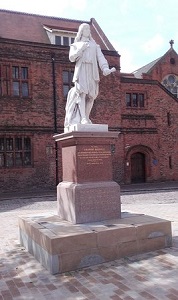
Andrew Marvell (31 maart 1621 – 16 augustus 1678)
Standbeeld in Hull
De Engelse schrijver en essayist John Fowles werd geboren in Leigh-on-Sea (Essex) op 31 maart 1926. Zie ook alle tags voor John Fowles op dit blog.
Uit: The Journals
“We also talked of the parent—child relationship. The crux is when the bridge of realization is reached. The otherness of parents, their separate personality, their defaults and often their in-feriority. A solid link of respect should be maintained (E) t — but respect can’t come when the ’truth’ (however false) seems to be cleat One’s parents seem inferior ‘x’ and nothing can make them respected ‘y’. Only hypocrisy and convention. It’s like being C of E when there is no faith. Eileen’s interesting theory that this break is good for creating indi-viduals; that happy families are those when the children have failed to ‘personalize’ or ‘separate’ their parents and so become submerged within the family ‘soul’ with unrealized individuality.
Going through a long period of self-discontent; no faith. Fair certainty that several of the projects. especially the plays, are good, but impossi-bility of long concentration and doubt about powers of technique and realization. Moreover, the consciousness that nothing will be done for at least a year. And at times the deliberate withdrawal from the world becomes too much of an effort to permit any surety.
21 November The constant quantum of self-estimation and the temporary urges to write which must die away because there is no time to canalize the inspi-ration. Sense of waste.
JW.Dapper, impeccable, and fairly well off. Conventional and sociable, but without great originality except for a certain facility of wit. Easy to get on with. Not strikingly dressed. Slightly French in manner, not thor-oughly English (brought up for some years in France).”
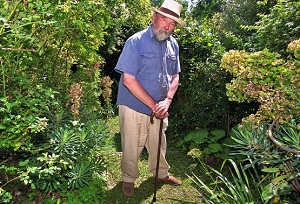
John Fowles (31 maart 1926 – 5 november 2005)
De Engelse dichter, schrijver en vertaler Edward FitzGerald werd geboren in Woodbridge, Suffolk, op 31 maart 1809. Zie ook alle tags voor Edward FitzGerald op dit blog.
Uit: Rubaiyat of Omar Khayyam
XI.
Here with a Loaf of Bread beneath the Bough,
A Flask of Wine, a Book of Verse—and Thou
Beside me singing in the Wilderness—
And Wilderness is Paradise enow.
XII.
“How sweet is mortal Sovranty!”—think some:
Others—”How blest the Paradise to come!”
Ah, take the Cash in hand and waive the Rest;
Oh, the brave Music of a distant Drum!
XIII.
Look to the Rose that blows about us—”Lo,
Laughing,” she says, “into the World I blow:
At once the silken Tassel of my Purse
Tear, and its Treasure on the Garden throw.”
XIV.
The Worldly Hope men set their Hearts upon
Turns Ashes—or it prospers; and anon,
Like Snow upon the Desert’s dusty Face
Lighting a little Hour or two—is gone.
Vertaald door Edward FitzGerald
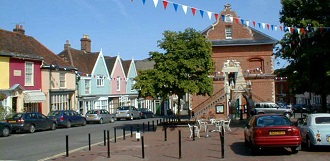
Edward FitzGerald (31 maart 1809 – 14 juni 1883)
Market Hill en Shire Hall in Woodbridge, Suffolk
De Franse schrijver, dichter en journalist Robert Brasillach werd geboren in Perpignan op 31 maart 1909. Zie ook alle tags voor Robert Brasillach op dit blog.
Psaume VII
J’ai passé cette nuit au mont des Oliviers :
Étais-je auprès de vous bien indigne, Seigneur ?
Je ne sais, mais la chaîne était lourde à mes pieds
Et je suais aussi, comme vous, ma sueur.
Ce n’est pas sans grand mal, voyez-vous, qu’on arrache
Notre cœur aux seuls biens, auxquels il fut voué,
Et l’Ange vient trancher plutôt qu’il ne détache
Le fil de ce bateau que vous aviez noué.
Vous avez trop connu cette terre où nous sommes,
Vous avez trop aimé l’air que nous respirions
Pour n’avoir pas souffert ce que souffrent les hommes
Et n’avoir pas gémi dans votre Passion.
Ah ! si demain, Seigneur, du jardin des Olives,
Je pouvais repartir vers le monde qu’on voit,
Laissez-moi boire encor aux fontaines d’eaux vives
Et laissez s’éloigner cette coupe de moi.
Mais s’il vous faut encor mon attente, Seigneur,
S’il vous faut l’aube noire et la plus dure peine,
Prenez l’arrachement et prenez la douleur,
Que votre volonté soit faite, et non la mienne.
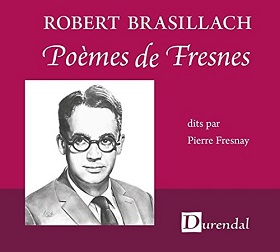
Robert Brasillach (31 maart 1909 – 6 februari 1945)
Cover audioboek
De Vlaamse schrijver, vertaler en publicist Peter Motte werd geboren in Geraardsbergen op 31 maart 1966. Zie ook alle tags voor Peter Motte op dit blog.
Uit: In memoriam: Alfons J. Maes (1950 – 2017)
“Het Vlaamse fandom had erg geleden onder te klein en te versnipperd, al was ook het Nederlandse fandom geen eenheid. Sommigen vermoeden dat de stedelijke agglomeratie van de Randstad het geografisch en verkeersinfrastructureel gemakkelijker maakte om verspreid wonende liefhebbers een tot twee keer per jaar samen te brengen. De aanwezigheid van de belangrijkste uitgeverijen voor sciencefiction en fantasy in de Nederlanden te Amsterdam kan een rol hebben gespeeld. Ook het woon-werk-verkeer is verschillend. Er was een periode na de Tweede Wereldoorlog waarin Vlamingen niet meer in hun eigen dorp of stadje werkten, maar als forenzen elke dag naar hun werk trokken. Nederlanders daarentegen verhuisden vaker voor hun werk. Daardoor werkten Vlamingen verder van huis, en zouden ze minder geneigd zijn geweest om in het weekend ergens heen te gaan, terwijl dat voor Nederlanders net een gelegenheid was om de vertrouwde omgeving eens te verlaten. Een gelijksoortig effect merkte auteur dezes op bij de leden van de beroepsvereniging de “Belgische Kamer voor Vertalers en Tolken”: op bijeenkomsten waren er altijd veel meer vertalers dan tolken aanwezig, vermoedelijk omdat tolken bijna nooit thuis werken en vaak zelfs moeilijke verplaatsingen moeten doen, terwijl vertalers thuiswerkers zijn of elke dag op dezelfde plek aan hetzelfde bureau zitten. En misschien geven Nederlanders gewoon minder om een kilometer meer of minder dan Vlamingen. Maar dat verklaart niet waarom de BeneluxCons desondanks ontstonden in België. De Vlaamse sciencefictionclub “SFAN” organiseerde in 1970 voor de eerste keer een bijeenkomst, en dat groeide uit tot het eerste BeneluxCon: “Sfancon 4” in 1974 te Gent. Daarvoor werkten Nederlandse en Belgische (Vlaamse en Waalse) verenigingen samen. Sindsdien was er afwisselend in Nederland en België een BeneluxCon. Half de jaren 80 werd het echter altijd moeilijker om iets in Vlaanderen gedaan te krijgen, waardoor “Fantasy World” in Antwerpen in 1988 de laatste BeneluxCon in België werd. Dat was het tekort dat Maes en enkele anderen besloten te verhelpen. En daarom heette die bijeenkomst in Antwerpen “The Comeback-Con”.
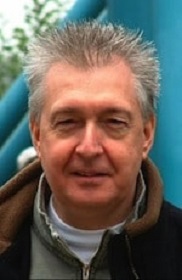
Peter Motte (Geraardsbergen, 31 maart 1966)
Op de foto: Alfons J. Maes

